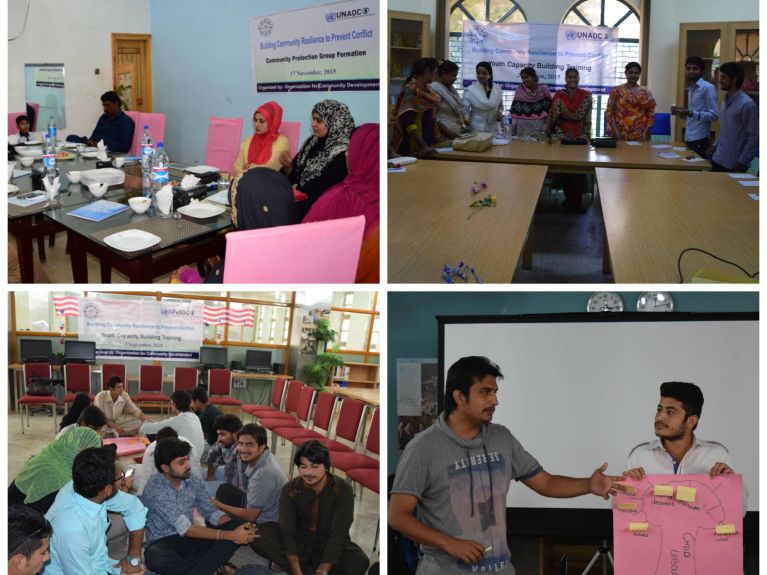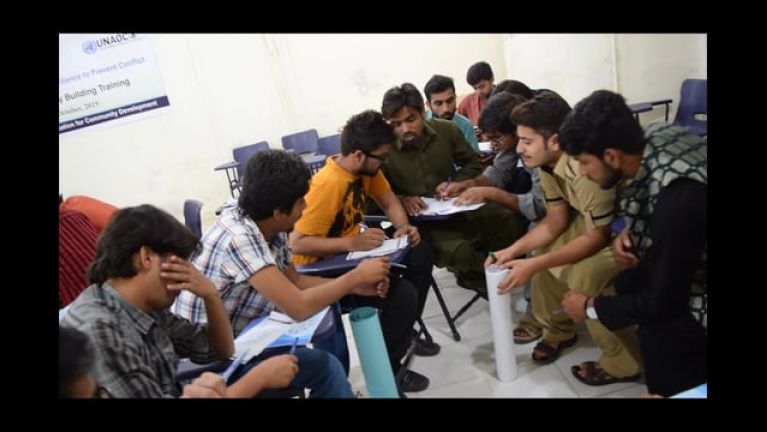Building Community Resilience to Prevent Conflict, Pakistan
Address division and discrimination in Pakistan society.

Project name: Building Community Resilience to Prevent Conflict (BCRPC)
Project location: Pakistan
Website: http://www.ocdpk.org
Facebook: www.facebook.com/OCD.PK
Dieses YouTube-Video kann in einem neuen Tab abgespielt werden
YouTube öffnenThird party content
We use YouTube to embed content that may collect data about your activity. Please review the details and accept the service to see this content.
Open consent formProject description:
There have been significant improvements in relation to the treatment of minorities in some parts of the world; however, minorities in many other parts of the world continue to be mistreated. They continue to suffer the abuse of their human rights at the hands of state and non-state actors who inflict atrocities on them with impunity. A significant proportion of conflicts around the globe has their roots in religious and cultural differences. Numerous attempts have been made by peace loving people around the globe to promote peace, religious tolerance, and interfaith harmony but despite these efforts, religious discriminations still exist.
Sadly, Pakistan has seen a rise in religious extremism and violence and these pose a great threat to peace and stability in our society particular for religious minorities. There is a strong element of discrimination which an average student in Pakistan is exposed to from a very early age. The curriculum and textbooks highlight the superiority of one religion over the other and openly suppress the minority religions/faiths. This reinforces the already promoted notions of religious discrimination that have become prevalent in our society. As a consequence, there is a dire need to protect and promote equality in Pakistan as well as create a sense of shared values and identify the commonalities rather than focus on the differences. There is a pressing need to highlight these issues, protect minorities through conflict preventive training sessions. Across Pakistan the absence of fairness, transparency, meritocracy and the rule of law in general leaves the minorities more vulnerable to abuse.
The Blasphemy law is a part of the Pakistan Penal Code, which was introduced in 1860 by the British Government to protect religious feelings. It may be observed that Section 295 provides protection to worship places of all classes of religions living in the subcontinent. It does not contain an element of discrimination or preference to any class. It maintains equality of all before the law. The law appears to maintain mutual harmony and peace as well as to promote the sense of mutual tolerance, understanding, and respect in the multifaceted society of the subcontinent. This section represents the typical example of a secular democratic law for benefit of all and loss to none.
Goal and purpose of the project:
The goal of the project is to; Address division & discrimination in Pakistani society and contribute to reducing support for religious-based violence and violent extremism and enhance the belief in values such as respect for diversity, acceptance, tolerance, and inclusiveness.
- Enhance capacities of youth/women of Punjab province to develop understanding about blasphemy law and protection measures
- Form Community Protection Groups (CPGs’) comprising of 10 members/group for mitigating risks of intolerance, respect for diversity and acceptance being faced by people of Punjab Province
- Train CPG members to minimize human rights violation incident in their localities particular if any religious based conflict situation emerges (post facto) in Punjab province
- Put in place countermeasures that promote opportunities for individuals with an alternative to and reduce the appeal of joining violent groups at Punjab province
Motivation of the applicant / applicant team:
The Pakistan Penal Code prohibits blasphemy against any recognized religion, providing penalties ranging from life imprisonment to death.
The project team to understand the depth and magnitude of the issue conducted informal interviews with the clergy and laity of all faiths and human rights-based organizations.
A few startling facts filtered out from our survey, were as follows:
- Lack of awareness of the laws, limitation, and response
- People don’t know exact content of this law
- Lack of interfaith interaction and opportunities for interfaith harmony and tolerance
Keeping these facts in mind the project team and stakeholder community was able to tailor this program.
Use of prize money:
The programs will be expanded into other districts and further buildup the existing movement of interfaith actions by developing interfaith relationships, conflict mitigation and friendship among diverse youth of post conflict communities. The prize money will help to empower youth and building their capacity to shape society that is free from discrimination and bias and where all religious are respected & protected. The beneficiaries and stakeholders will explore the role of diversity in local communities for acceptance and peace building. The end product shall be a network of young people belonging to various religions in order to set an example of interfaith harmony and religious freedom in Pakistan. Automatically they will be a paradigm of tolerance and harmony for social cohesion.
